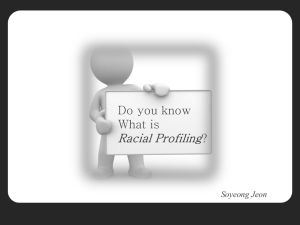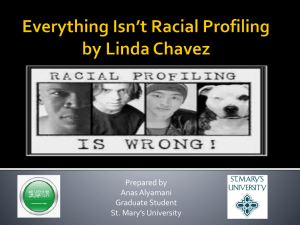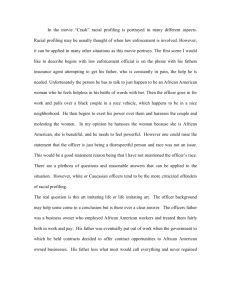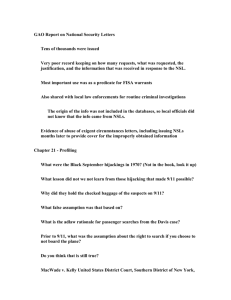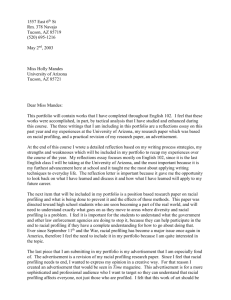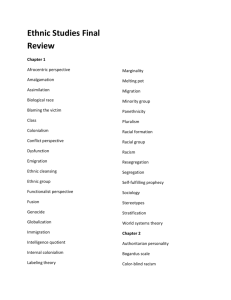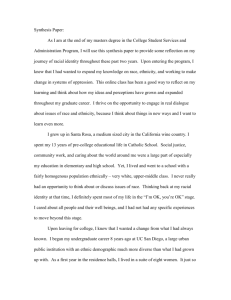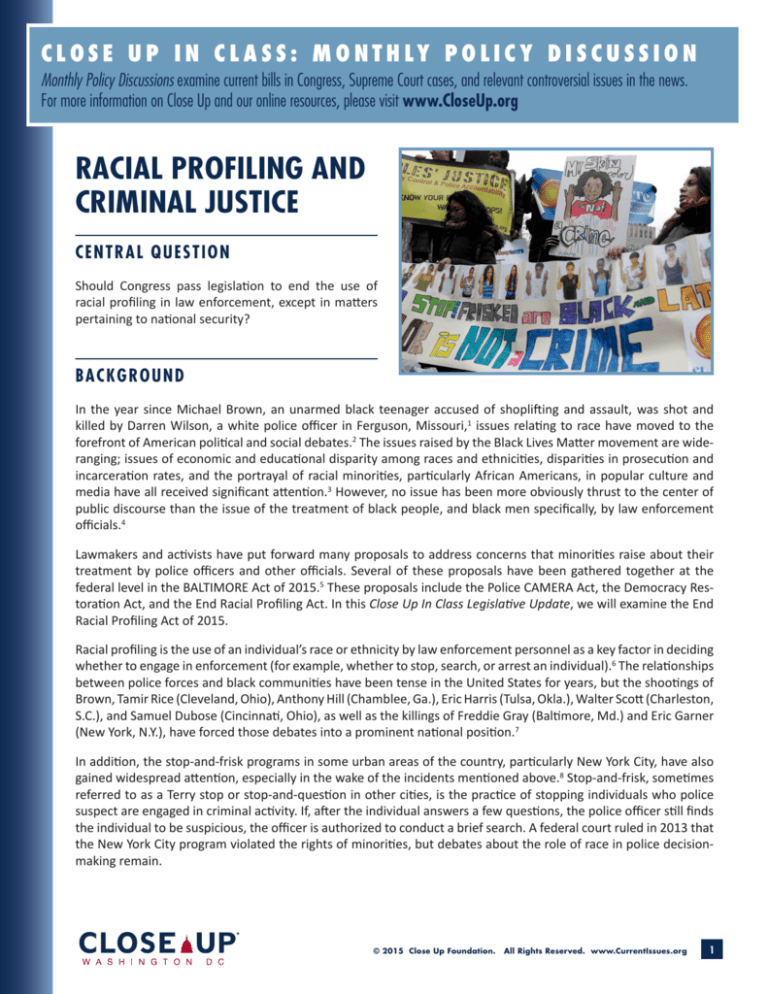
C L O S E U P I N C L A S S : M O N T H LY P O L I C Y D I S C U S S I O N
Monthly Policy Discussions examine current bills in Congress, Supreme Court cases, and relevant controversial issues in the news.
For more information on Close Up and our online resources, please visit www.CloseUp.org
RACIAL PROFILING AND
CRIMINAL JUSTICE
CE NTR A L Q U E S T I O N
Should Congress pass legislation to end the use of
racial profiling in law enforcement, except in matters
pertaining to national security?
BA CK GR O U N D
In the year since Michael Brown, an unarmed black teenager accused of shoplifting and assault, was shot and
killed by Darren Wilson, a white police officer in Ferguson, Missouri,1 issues relating to race have moved to the
forefront of American political and social debates.2 The issues raised by the Black Lives Matter movement are wideranging; issues of economic and educational disparity among races and ethnicities, disparities in prosecution and
incarceration rates, and the portrayal of racial minorities, particularly African Americans, in popular culture and
media have all received significant attention.3 However, no issue has been more obviously thrust to the center of
public discourse than the issue of the treatment of black people, and black men specifically, by law enforcement
officials.4
Lawmakers and activists have put forward many proposals to address concerns that minorities raise about their
treatment by police officers and other officials. Several of these proposals have been gathered together at the
federal level in the BALTIMORE Act of 2015.5 These proposals include the Police CAMERA Act, the Democracy Restoration Act, and the End Racial Profiling Act. In this Close Up In Class Legislative Update, we will examine the End
Racial Profiling Act of 2015.
Racial profiling is the use of an individual’s race or ethnicity by law enforcement personnel as a key factor in deciding
whether to engage in enforcement (for example, whether to stop, search, or arrest an individual).6 The relationships
between police forces and black communities have been tense in the United States for years, but the shootings of
Brown, Tamir Rice (Cleveland, Ohio), Anthony Hill (Chamblee, Ga.), Eric Harris (Tulsa, Okla.), Walter Scott (Charleston,
S.C.), and Samuel Dubose (Cincinnati, Ohio), as well as the killings of Freddie Gray (Baltimore, Md.) and Eric Garner
(New York, N.Y.), have forced those debates into a prominent national position.7
In addition, the stop-and-frisk programs in some urban areas of the country, particularly New York City, have also
gained widespread attention, especially in the wake of the incidents mentioned above.8 Stop-and-frisk, sometimes
referred to as a Terry stop or stop-and-question in other cities, is the practice of stopping individuals who police
suspect are engaged in criminal activity. If, after the individual answers a few questions, the police officer still finds
the individual to be suspicious, the officer is authorized to conduct a brief search. A federal court ruled in 2013 that
the New York City program violated the rights of minorities, but debates about the role of race in police decisionmaking remain.
© 2015 Close Up Foundation.
All Rights Reserved. www.CurrentIssues.org
1
R A C I A L P RO F I L I N G A N D C R I M I N A L J U S T I C E : B A C KG RO U N D
Many law enforcement officials and experts argue that racial profiling is a useful tool in preventing crime and
apprehending criminals. Supporters of the practice argue that it is not about racism, it is about statistics. By
examining data about who commits certain types of crimes, using information such as the average age range,
gender, socioeconomic background, race, and level of education, police officers can more accurately narrow
down a range of suspects. Supporters also argue that police officers do not act merely on the basis of race;
instead, they consider a profile of characteristics that include race and other observed behaviors in order to
determine whether or not someone is worthy of questioning.
In fact, some advocates of the practice argue that the term “racial profiling” is not accurate. They claim that
police are using a broad range of data, of which race happens to be a part, to form a profile. In addition, they
claim that law enforcement officials are profiling by location—for example, patrolling high-crime neighborhoods
more frequently. That some of those neighborhoods are home to large numbers of minorities, they say, is a
coincidence.
Opponents of racial profiling argue that its use is unfair to minorities, particularly young male minorities, because it makes them suspects for no reason other than their membership in a demographic group. They also
argue that it is a violation of the 14th Amendment’s guarantee of equal protection under the law because it
automatically means that certain groups will be treated individually. In addition, opponents of the practice claim
that racial profiling diminishes community trust because it causes members of minority groups to become suspicious of police officers and city officials more generally.
This bill, the End Racial Profiling Act, is designed to stop federal law enforcement agencies (such as the Federal
Bureau of Investigation; the Bureau of Alcohol, Tobacco, Firearms, and Explosives; and the Marshals Service)
from using racial profiling in their police work. The bill also provides funding through grant programs to encourage local police forces to stop using racial profiling practices. The bill makes the Department of Justice responsible for tracking uses of racial profiling across the country, allows the Department of Justice to investigate police
departments and state agencies using the practice, and makes it easier for victims of racial profiling to sue the
agency that they feel wronged them.
Versions of this bill have been introduced in both the Senate and the House of Representatives.
Note: This bill does not relate to the use of racial profiling in efforts to combat terrorism or protect national
security.
2
© 2015 Close Up Foundation.
All Rights Reserved. www.CurrentIssues.org
RACIAL PROF IL IN G AND C RI MI N A L J U S T I C E : MO D E L B IL L
“End Racial Profiling Act”9
114th CONGRESS
1st Session
“H.R. 1933” “S. 1056”
April 22, 2015
A BILL
To eliminate racial profiling by law enforcement, and for other purposes.
It shall be enacted that:
1. The use of racial profiling practices by law enforcement officials will be prohibited;
2. Individuals or groups injured by racial profiling will be granted the right to sue for damages (declaratory and
injunctive);
3. The attorney general will be required to:
• Maintain adequate policies and procedures to eliminate racial profiling and to cease existing practices
that permit racial profiling;
• Award grants and contracts for the collection of data relating to racial profiling and for the development
of best practices and systems to eliminate racial profiling;
• Issue regulations for the collection and compilation of data on racial profiling and for the implementation of this Act;
4. State or local governmental entities or state, local, or tribal law enforcement agencies that apply for grants
under the Edward Byrne Memorial Justice Assistance Grant Program and the Cops on the Beat Program
must certify that they maintain adequate policies and procedures for eliminating racial profiling and have
eliminated any practices that permit or encourage racial profiling.
BILL INFORMATION
Support: Senator Benjamin Cardin, D-Md., introduced S. 1056. It currently has 18 Democratic co-sponsors and
0 Republican co-sponsors. Representative John Conyers, D-Mich., introduced the House bill. It currently has 97
Democratic co-sponsors and 0 Republican co-sponsors.
Committee Assignment: Senate Judiciary Committee; House Committee on the Judiciary, Subcommittee on
Crime, Terrorism, Homeland Security, and Investigations
© 2015 Close Up Foundation.
All Rights Reserved. www.CurrentIssues.org
3
RACIAL PRO F IL IN G AND C RI MI N A L J U S T I C E : DE BA T E
Should Congress pass legislation to end the use of racial profiling in law enforcement, except in matters pertaining to national security?
YES: Racial profiling is unfair and antithetical to
American values.
NO: Racial profiling is a necessary strategy police
use to find and arrest criminals.
In a 2004 study, approximately 32 million Americans
reported that they had been the victims of racial profiling at some point in their lives.10 This is an unfair
abuse of the rights of American citizens. In addition,
there is no evidence to suggest that these laws are
effective or lead to higher rates of arrest of serious
criminals.
Racial profiling is a necessary tool of law enforcement to keep communities safe. The system is an
inconvenience to some but it is done in the service
of many.
According to the National Association for the Advancement of Colored People, “It is difficult for our
faith in the American judicial system not to be challenged when we cannot walk down the street, drive
down an interstate, go through an airport, or even
enter into our own homes without being stopped
merely because of the color of our skin.”11
In the United States, we believe that a person is innocent until proven guilty. But racial profiling assumes that anyone who fits a certain profile, largely
based on race or ethnicity, is guilty and deserves to
be searched. These policies breed distrust and fear
between law enforcement personnel and the communities they are supposed to serve.
This distrust makes policing in minority communities
more difficult and dangerous, because residents in
such neighborhoods are less likely to report crimes
or to turn in known criminals. One protester’s sign
at a recent Baltimore rally read, “Who do you call
when the murderer wears a badge?”12 Yet almost all
police officers are good, hard-working people doing
a dangerous, thankless job.
As President George W. Bush said in 2001, “Too
many of our citizens have cause to doubt our nation’s justice when the law points a finger of suspicion at groups instead of individuals.”13
However, in this highly partisan era when even the
insistence that “Black Lives Matter” is viewed as controversial, Republicans are unlikely to act on what
was, at one time, a commonsense notion—the notion that we are all created equal.
4
© 2015 Close Up Foundation.
All Rights Reserved. www.CurrentIssues.org
Race is never used as the only factor in determining who to stop, interrogate, or arrest. Race is one
of many factors that is used to develop a profile of a
suspect. Kathleen Parker, in a column about the Trayvon Martin–George Zimmerman episode, explained,
“African Americans are right to perceive that Martin
was followed because he was black, but it is wrong
to presume that recognizing a racial characteristic is
necessarily racist. It has been established that several burglaries in Zimmerman’s neighborhood primarily involved young black males…. In the courtroom,
it’s called profiling. In the real world, it’s called common sense.”14
Michael Bloomberg, the former mayor of New York
City, argued, “There is just no question that StopQuestion-Frisk has saved countless lives. And we
know that most of the lives saved, based on the statistics, have been black and Hispanic young men.”15
New York City Police Commissioner Bill Bratton added, “Stop-and-frisk is such a basic tool of policing. It’s
one of the most fundamental practices in American
policing. If cops are not doing stop-and-frisk, they are
not doing their jobs. It is a basic, fundamental tool
of police work in the whole country. If you do away
with stop-and-frisk, this city will go down the chute
as fast as anything you can imagine…. You have to
take action against minor offenses. It has to be done
respectfully, and it has to be done consistently…time
and again. But it has to be done.”16
The tragic story of the city of Detroit offers policymakers a warning of what can happen when cities
abolish their stop-and-frisk laws. When Detroit ended its stop-and-frisk policy in 1973, crime rates—
specifically murder rates—spiked, causing many residents to flee the city for the safety of the suburbs.17
RACIAL PROF IL IN G A ND C RI MI N A L J U S T I C E : QU E S T I ON S
T O CON SIDER
What is your position on the End Racial Profiling Act?
What are the strongest points raised by each side of the argument?
Consider the problem that the End Racial Profiling Act is attempting to address. Do you think this is the best possible solution? If not, what other policies would you propose?
© 2015 Close Up Foundation.
All Rights Reserved. www.CurrentIssues.org
5
RA CIAL PROF IL IN G A ND C RI MI N A L J U S T I C E : E N D N O T E S
Alcindor, Yamiche. “Michael Brown, Sr.: ‘A Piece of Me Is Gone.’” USA Today. 1 Aug. 2015. Gannett Newspapers.
Web. 2 Aug. 2015. http://www.usatoday.com/story/news/nation/2015/08/01/michael-brown-sr-fergusonanniversary/30977369/.
1
Ross, Janell. “Why Black Lives Matter Keeps Tripping up Politicians — of Both Parties.” Washington Post. 28 July 2015.
Web. 3 Aug. 2015. http://www.washingtonpost.com/news/the-fix/wp/2015/07/28/why-black-lives-matter-keepstripping-up-politicians-of-both-parties/.
2
Halper, Evan, and Kurtis Lee. “How Black Lives Matter Forced Campaigns to Toss Their Strategies on Black Voters.” Los
Angeles Times. 31 July 2015. Web. 3 Aug. 2015. http://www.latimes.com/nation/la-na-campaign-black-lives-20150731story.html#page=1.
3
“#BlackLivesMatter National Demands.” BlackLivesMatter.com. Web. 3 Aug. 2015. http://blacklivesmatter.com/
demands/.
4
S. 1610 - BALTIMORE Act, 114th Congress (2015-2016). Related Bills. Congress.gov. Web. 3 Aug. 2015. https://www.
congress.gov/bill/114th-congress/senate-bill/1610/related-bills.
5
National Association for the Advancement of Colored People. “Campaign to End Racial Profiling: How to Being A
Dialogue About Racial Profiling.” Web. 3 Aug. 2015. http://action.naacp.org/page/-/Criminal Justice/RP One Pager 7-2-12
Draft.pdf.
6
Perez-Peña, Richard. “Fatal Police Shootings: Accounts Since Ferguson.” New York Times. 7 Apr. 2015. Web. 3 Aug. 2015.
http://www.nytimes.com/interactive/2015/04/08/us/fatal-police-shooting-accounts.html?_r=0.
7
Gray, Mara, and Mark Morales. “NYPD Stop-and-Frisk Numbers Questioned.” Wall Street Journal. 9 July 2015. Web. 3
Aug. 2015. http://www.wsj.com/articles/nypd-stop-and-frisk-numbers-questioned-143648992.
8
Full text of Act: “H.R.1933 - End Racial Profiling Act of 2015, 114th Congress (2015-2016).” Congress.gov. Web. 3 Aug.
2015. https://www.congress.gov/bill/114th-congress/house-bill/1933/text.
9
10
National Association for the Advancement of Colored People. “NAACP Statement on the Introduction of the End Racial
Profiling Act In the US House.” 30 July 2013. Web. 3 Aug. 2015. http://www.naacp.org/press/entry/naacp-statement-onthe-introduction-of-the-end-racial-profiling-act-in-the.
Ibid.
11
6
12
“Black Lives Matter Activists in South Carolina Demand Reform After Police Killing of Walter Scott.” Democracy Now! 14
Apr. 2015. Web. 6 Aug. 2015. http://www.democracynow.org/2015/4/14/black_lives_matter_activists_in_south.
13
Badger, Emily. “The Long, Halting, Still-unfinished Fight to End Racial Profiling in America.” Washington Post. 5 Dec. 2014.
Web. 3 Aug. 2015. http://www.washingtonpost.com/news/wonkblog/wp/2014/12/05/the-long-halting-still-unfinishedfight-to-end-racial-profiling-in-america/.
14
Parker, Kathleen. “Unanswered Questions in Trayvon Martin Case.” Washington Post. 16 July 2013. Web. 6 Aug. 2015.
https://www.washingtonpost.com/opinions/kathleen-parker-unanswered-questions-in-trayvon-martin-case/2013/07/16/
b154e1b0-ee44-11e2-a1f9-ea873b7e0424_story.html?hpid=z2.
15
Capehart, Jonathan. “‘Stop and Frisk,’ Bloomberg and Me.” Washington Post. 13 Dec. 2013. Web. 6 Aug. 2015. http://
www.washingtonpost.com/blogs/post-partisan/wp/2013/12/30/stop-and-frisk-bloomberg-and-me/.
16
Capehart, Jonathan. “‘Stop and Frisk,’ Bloomberg and Me.” Washington Post. 13 Dec. 2013. Web. 6 Aug. 2015. http://
www.washingtonpost.com/blogs/post-partisan/wp/2013/12/30/stop-and-frisk-bloomberg-and-me/.
17
Barone, Michael. “’Stop and Frisk’ Doesn’t Target Minorities, It Protects Them.” Washington Examiner. 21 Aug. 2013.
Web. 6 Aug. 2015. http://www.washingtonexaminer.com/stop-and-frisk-doesnt-target-minorities-it-protects-them/
article/2534499.
© 2015 Close Up Foundation.
All Rights Reserved. www.CurrentIssues.org

